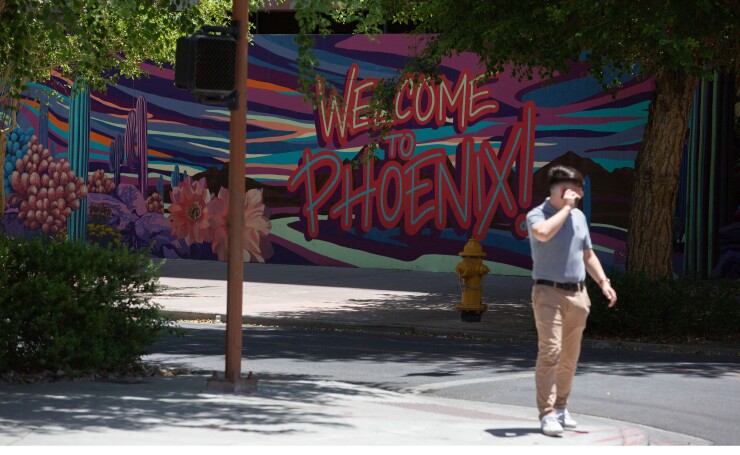Phoenix returns to the municipal market this week with its first new money general obligation bond issue in 12 years and a plan to be a more frequent borrower using that credit source in the future.
Kathleen Gitkin, the city's chief financial officer, said she has high expectations for the $238.8 million tax-exempt and taxable deal scheduled to price Tuesday through a Piper Sandler-led team of underwriters, given the long gap since the last issue.
"The feedback that we're getting from the syndicate is that people are incredibly excited for Phoenix paper," she told The Bond Buyer last week. "I think there is some pent-up demand."

The previous new money GO bond issue from the nation's fifth-largest city
The upcoming deal taps $500 million in authorization approved in November by voters in
Gitkin said Phoenix has been financing non-enterprise fund capital projects with cash or excise tax revenue bonds before opting to seek new GO authorization that would deliver affordable and critical projects with available city and construction industry resources.
"The vision and the focus going forward is to do smaller programs, like this $500 million program, but more frequently, so $500 million dollar programs every five to seven years," she said.
In 2022, a Phoenix fiscal capacity committee found that
The bonds are payable with Phoenix's 81 cents-per-$100 assessed valuation secondary property tax rate, which the city council can independently increase, while bondholders are afforded protection via a statutory lien on the tax. The debt is rated Aa1 by Moody's Ratings, AAA by Fitch Ratings, and AA-plus by S&P Global Ratings — all with stable outlooks.
The deal's $133.6 million of Series A tax-exempt bonds are structured with serial maturities from 2032 to 2047, as well as a term bond, according to the preliminary official statement. The $105.18 million of Series B taxable debt carries maturities between 2028 and 2032.
The structure takes advantage of a debt service decline after 2027 for the city's $545.62 million of outstanding GO bonds.
"We've layered the new debt in so that we can maintain the same (secondary) property tax rate," Gitkin said. "And the expectation is…when we have a future bond program, we would layer that in."
With issuers
The performance of the deal's tax-free debt could depend on the call feature, with a call shorter than nine or 10 years undermining demand, he added. The city is
The taxable Series B would carry a make-whole call.
"It seems that retail and (separately managed account) demand is strongest inside of 10-years, so some buyers may avoid these just based on their investment policy, but the relative scarcity of the credit should counteract that and broaden the appeal to out-of-state investors," Luby said.
Gitkin said the deal's interest rate should be under 5% and that the remainder of the 2023 bond authorization would be sold at this time next year.
"If we start seeing cash flow on the projects speed up, we can issue it sooner," she said. "If we don't see the projects' cash flowing as fast, we can slow it down."
Rating agencies cited the city's population and economic growth.
"Phoenix continues to maintain its healthy financial profile, characterized by very strong operating reserves and liquidity coupled with a stable operating budget supported by diverse revenue streams that have increased in line with the city's expanding economy," S&P analyst Daniel Golliday said in a statement.
Phoenix had an estimated 1.65 million residents in 2023, according to the Census Bureau — up 71% since 1990.
Rising pension costs were also noted in rating reports.
"The city's weakest credit feature is the long-term liability burden, a result of rapid population growth-related capital needs as well as rising pension liabilities and contributions," Fitch said.
The unfunded liability in the Employees' Retirement System, as well as the city's share of the state-run Public Safety Personnel Retirement System rose to $5 billion in fiscal 2023 from nearly $4.64 billion in fiscal 2022.

Gitkin said the city has been able to make pension payments "above and beyond" actuarially required contributions.
The city council adopted a $2.13 billion
The deal's POS contains no mention of potential climate-related risks. Gitkin said disclosures were based on guidance from bond counsel and city attorneys.
A Municipal Market Analytics report last August
Thomas Doe, MMA's president, said bond counsel and municipal advisors have not advocated for climate risk disclosure amid market disinterest.
"With data so widely available it is egregious there is no disclosure with issuers whose risk is so easily identified," he said in an email.
S&P's rating report said "Phoenix is exposed to natural capital risks from persistent drought conditions and water-supply stress and long-term physical climate risks, such as extreme heat exposure," adding the city developed a Climate Action Plan in 2021.
An average temperature of 102.7 degrees in Phoenix in July 2023 set the record for the hottest month for a U.S. city as maximum temperatures reached 110 degrees or higher
The latest weekly
Other underwriters in the Phoenix deal are Morgan Stanley, Stifel, Blaylock Van, PNC Capital Markets, and Raymond James. Greenberg Traurig is the bond counsel and Public Resources Advisory Group is the financial advisor.





